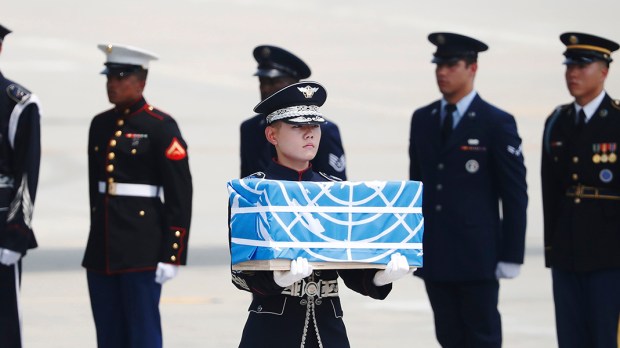More than a million people were killed in the Korean War, including about 36,000 American soldiers. About 7,700 GIs are considered as missing from the conflict, which raged from 1950-53. Fifty-three-hundred of the remains are believed to still be in North Korea.
Pending verification, some of those missing may be on their way home.
On Friday, the 65th anniversary of the cessation of hostilities, a U.S. military plane made a rare trip into North Korea, to the coastal city of Wonsan, to receive 55 cases said to contain the remains of servicemen killed in the war.
The Air Force C-17 aircraft then flew to the Osan Air Base in Pyeongtaek, near the South Korean capital of Seoul, according to the Associated Press. A formal repatriation ceremony will be held there Wednesday.
The cases were draped in the flag of the United Nations, the flag that American troops fought under in the Korean War.
President Trump tweeted a thanks to North Korean leader Kim Jong Un for the return of the remains, which Kim had promised during Trump’s meeting with him in June.
White House spokeswoman Sarah Sanders said that “today’s actions represent a significant first step to recommence the repatriation of remains from North Korea and to resume field operations in North Korea to search for the estimated 5,300 Americans who have not yet returned home.”
“Now, we will prepare to honor our fallen before they continue on their journey home,” said U.S. Forces Korea commander Gen. Vincent K. Brooks, in a statement from the U.N. Command.
Next week, the remains will be taken to the Defense POW/MIA Accounting Agency in Hawaii, where series of forensic examinations will be done to determine if they are human and if the dead were American or allied troops killed in the conflict.
AP explained more of the background:
The remains are believed to be some of the more than 200 that North Korea has held in storage for some time, and were likely recovered from land during farming or construction. The vast majority of the war dead, however, have yet to be located and retrieved from cemeteries and battlefields across the countryside. Efforts to recover American war dead had been stalled for more than a decade because of a standoff over North Korea’s nuclear program and a previous U.S. claim that security arrangements for its personnel working in the North were insufficient. From 1996 to 2005, joint U.S.-North Korea military search teams conducted 33 recovery operations that collected 229 sets of American remains. The last time North Korea turned over remains was in 2007, when Bill Richardson, a former U.N. ambassador and New Mexico governor, secured the return of six sets.
The New York Times noted that remains that were returned in the past were “found to be mixed with those of unidentified individuals and even with animal bones.”
The Korean War ended in an armistice on July 27, 1953, but was never formally ended. North Korea has been pushing for a peace treaty, and the removal of U.S. troops from the peninsula. Washington has made no commitments and is insisting on seeing concrete progress toward denuclearization first.
South Korean President Moon Jae-in welcomed today’s ceremony and announced that he wants to sign “a formal peace agreement with North Korea” this year.

